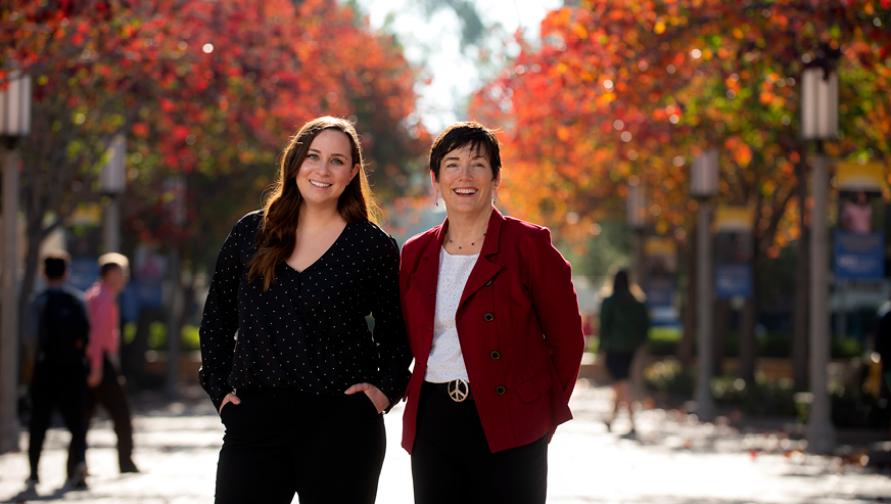
By Charity Lindsey
UC Irvine Associate Professor of History Laura Mitchell and Ph.D. student in history Stephanie Narrow want to change the way we think about history.
With the support of a grant from the American Historical Association (AHA), the two have launched a series of measures to enrich and expand career opportunities for history graduate students at UCI.
UCI was one of 20 institutions selected for a 2018-20 Career Diversity Implementation Grant, part of an AHA initiative funded by the Andrew W. Mellon Foundation to better prepare graduate students and early-career historians for a range of career options, within and beyond the university. As a Career Diversity fellow at UCI, a role funded by the grant, Narrow is collaborating with Mitchell and a faculty team to ensure graduate students in the program are prepared for a broad range of career opportunities.
Mitchell described their approach to the initiative as three-pronged. One focuses on increasing instructional research, highlighted by a new course in history pedagogy launched last year. Another aims to produce a wide variety of professional development opportunities, and the final component involves creating a fully funded, robust internship program.
She noted that no one is better equipped to improve the opportunities available to graduate students than a current graduate student “living through it.”
Narrow earned a B.A. from UCLA and an M.A. from CSU Northridge, both in history, and is now in her second year as a doctoral student at UCI. She interned for four years at the Autry Museum of the American West in L.A., and when Mitchell asked what she wanted to do on orientation day at UCI, she said she was interested in becoming a museum curator.
“Seeing that she opened that dialogue really encouraged me to pursue my Ph.D. here,” Narrow said. “I want to find ways to get people to think critically about a broad range of topics, ideas and historical inquiries.”
While still interested in museum curation, UCI’s program has encouraged her to explore other career options, like teaching at the community college level or working in university administration, similar to her current role.
“I think the barrier separating academic and public history is more permeable than ever…Now you have university professors curating museum exhibitions,” Narrow said. “I get really excited when I see that sort of cross-pollination.”
While Narrow and Mitchell’s focus is on enriching education specifically for history graduate students, many of the strategies can be applied to other areas of the humanities.
“It’s about finding ways to open a dialogue about how we can think more broadly about the really wonderful work that historians can do both in and outside of the academy,” Mitchell said. A trained historian of Africa, Mitchell has worked at UCI for 16 years and is currently writing a book that explores the history of colonial collecting. Her research challenges stereotypes about Africa and reveals that a significant amount of early knowledge around botany and zoology came from the region.
In a similar way, she wants to challenge the misconceptions surrounding academic historians. “We’re not really as dusty and curmudgeonly as the public stereotype,” she said. “The best thing we could be doing to communicate that is sending out really energetic, motivated, highly articulate individuals who have a passion for what they do.”
Mitchell was among the first faculty members to become certified to teach in the new Anteater Learning Pavilion last year through the Active Learning Institute under the Division of Teaching Excellence & Innovation. She described the training as “one of the most engaging, exciting things” she’s done at UCI and jumped at the opportunity to facilitate a faculty learning community that would continue the conversation about innovative teaching methods. For her efforts in leading this first-of-its-kind group on campus, the UCI Office of the Provost and Executive Vice Chancellor selected Mitchell as one of four faculty members to be named a Provost’s Teaching Fellow during the 18-19 academic year.
Similarly, working with a cohort of other history departments around the country through AHA’s initiative has been a major benefit, Mitchell said, as it has allowed them to share ideas with and learn from other programs to find the best solutions for students.
Some of their recent efforts have been devoted to coordinating events for humanities graduate students, such as a workshop held in November about ImaginePhD, a free, online career exploration and planning tool.
Another series of events is entitled Historians@Work, which invites history Ph.D.s to participate in a panel discussion. Graduate students hear from professionals who share details about what they do on a day-to-day basis and how having a Ph.D. has shaped their careers.
As Mitchell and Narrow seek to expand the internship program, they’re looking toward other campus departments and outside business partners for support. The ideal scenario, Mitchell described, would allow all history Ph.D. students three years of work-based support — one year as a teaching assistant, one as an intern and a third in which each student would choose one or the other.
“Part of what we’re trying to do is really slowly create a culture change in which both students and faculty can talk about the investment that students make in professionalization,” Mitchell said. “That it’s important and that it doesn’t take away from research — that it can enrich their research.”
Follow Mitchell and Narrow’s progress on Instagram @UCIhistorycareers and Twitter @HistCareersUCI
Photo credit: Steve Zylius / UCI
